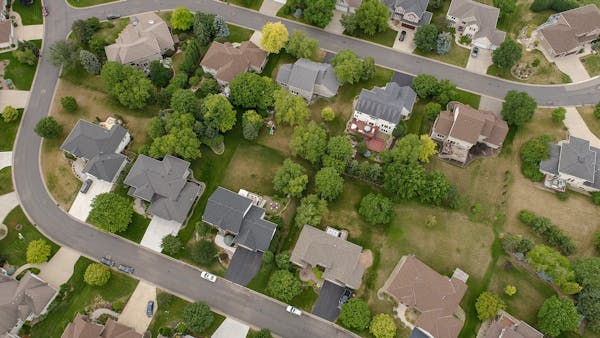Several Minnesota lawmakers are trying to bring housing developers and city officials to the bargaining table on legislation designed to create more affordable housing across the state.
DFL Rep. Steve Elkins debuted a wide-ranging bill Monday aimed at spurring the construction of more entry-level and multifamily housing. Called the "Housing Affordability Act," it follows a Star Tribune report Sunday that examined how single-family zoning restrictions and other regulations have contributed to racial segregation.
"NIMBYISM is alive and well, not just in the Twin Cities. This is a nationwide issue," said Elkins, of Bloomington. But he said the problem is particularly pronounced here. "I think we have the worst homeownership disparities between Caucasians and people of color. And as the Star Tribune story lays out starkly, this is why. These are the means by which this happens."
His proposal would limit many requirements cities impose on residential development, making it easier for developers to build more housing. The bill also would allow cities to assess certain fees and use other mechanisms to help cover infrastructure costs that come with the addition of more housing.
Some Republican legislators also are calling for zoning changes. Rep. Jim Nash, R-Waconia, has asked the co-chairs to reconvene the Legislative Commission on Housing Affordability, a bipartisan panel of state senators and representatives that met for the first and only time about 18 months ago. Co-chair Rep. Peter Fischer, DFL-Maplewood, said he plans to reconvene the commission this fall.
Nash would like the commission to look at city mandates such as minimum lot size or the type of exterior features required on new homes, but he acknowledged that improving home affordability for everyone is like a "quadratic equation" that will require multiple steps before it can be solved.
"For people who say they want to call Minnesota home, we should make it a little easier to call a piece of Minnesota your home and sink down your roots," Nash said Monday.
Elkins' bill faces a tricky path at the State Capitol. City officials have jettisoned past legislative efforts to restrict their local control over land use decisions, and developers have opposed attempts to allow cities to use development impact fees to cover infrastructure costs, Elkins said. He hopes that by bundling both changes into one package, he can strike an agreement.
He plans to introduce the measure during the Legislature's September special session. But Elkins said he is already talking with key groups about it and the bill will evolve over the coming months. He aims to pass the changes during the next regular session, which starts in January.
Some provisions in the initial version include an allowance for duplexes in all low-density residential housing areas and an end to requirements for multicar garages and "upscale" home exteriors. In newly developing areas of the metro, communities cannot require minimum lot sizes to be greater than one-fifth of an acre, except for agricultural reserves.
"It is clear that Minnesota must enact zoning and housing policy reforms," David Siegel, executive director of Housing First, a group that represents homebuilders and remodelers, said in a statement. He also called for the Legislative Commission on Housing Affordability to get to work on the issue, and said Elkins' bill "is a good starting point for housing policy reform and balances the needs of homeownership access, housing affordability, and local communities."
Meanwhile, the League of Minnesota Cities supported a couple of changes in Elkins' bill to add new tools for cities to pay for infrastructure needed for a new housing development, such as roads and sewer systems. But the League raised concerns with the bulk of the legislative proposal.
"We're continuing to provide feedback to Representative Elkins. I think the starting point of this bill is very concerning to the League and to our members," said Daniel Lightfoot, lobbyist with the League of Minnesota Cities. "It definitely goes against a lot of what we promote by way of local communities addressing their locally identified housing needs. "
Instead of "top-down" mandates, Lightfoot said the Legislature should tackle housing disparities by supplying more matching grants to local housing trust funds, increasing tax increment financing flexibility and promoting policies that require developers to have a percentage of affordable units.
The Legislature has passed bills in recent years to help subsidize affordable housing, Elkins said, but has not made any progress on the policies he is pushing.
Sen. Rich Draheim, R-Madison Lake, proposed the Legislative Commission on Housing Affordability and has been pitching a bill in the Senate the last two years. It is similar to Elkins' proposal but focused on encouraging affordable homeownership opportunities. He plans to bring his bill back in the regular session.
Jessie Van Berkel • 651-925-5044
MaryJo Webster • 612-673-1789
Former DFL Senate Majority Leader Kari Dziedzic dies of cancer at age 62

How the Star Tribune is covering the 2024 election

Fact check: Walz and Vance made questionable claims during only VP debate

In Tim Walz's home city, opposing groups watch him debate on the national stage

